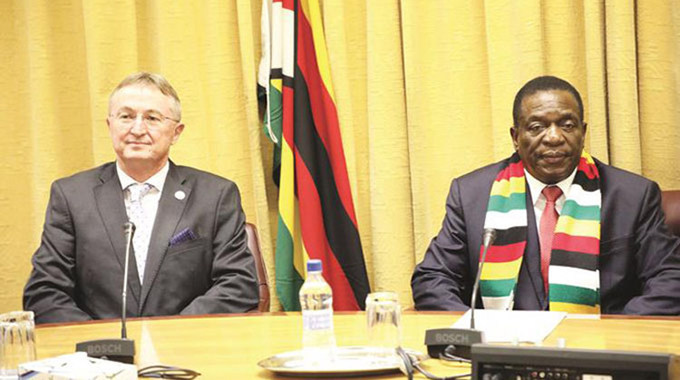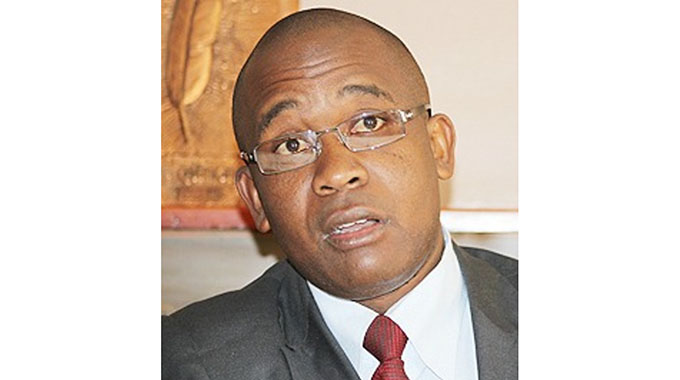ICRISAT return step in right direction

Elliot Ziwira Senior Writer
Food security remains key to nationhood as hungry citizens are prone to hypocritical tendencies of charlatans who promise hanging apples and pies in supposition in exchange for votes, and claim to remain on their side through toil, only to ditch them when it suits them.
There is something about food aid that creates an element of entitlement to those such aid is meant, thus robbing them of both urgency and initiative.
Giving people fish has never been known as a panacea to poverty, but teaching individuals how to fish goes a long way in mitigating the expectancy that comes with aid, hence fostering sustainability and self-reliance.
That Zimbabwe was once known as the breadbasket of the region, says a lot about the state of our agriculture then and now.
There is something that we did wrong, something that is still in our power to put right.
Like all other revolutions, the agrarian revolution is not a once off phenomenon. It is rather a continual process.
Whereas history cannot be rubbished or ignored, for it is the enforcer and shaper of the future, rapping on past glory is seeking success in futility.
The recent announcement by the International Crops Research Institute for the Semi-Arid Tropics (ICRISAT) that they were relocating to Zimbabwe to invest millions of dollars towards the modernisation of Matopos Research Station is sweet music to the ear.
It is not only the relocation of the international research body that is significant here, since it conforms to President Mnangagwa’s re-engagement drive, but the realisation that research is an important cog in agricultural reform.
Founded in 1972, ICRISAT, headquartered in Patancheru, India, is an international organisation that conducts agricultural research for rural development, and is managed by a full-time director-general functioning under the overall guidance of an international Governing Board.
Synergies accrued through such linkages with organisations like ICRISAT will go a long way in modernising our agriculture, which lags behind despite our geographical blessings.
At this point one can draw inspiration from Israel.
Notwithstanding its geographical implications, which naturally do not favour farming, Israel’s agriculture is highly developed.
It is a powerful industry. With only 20 percent arable land, unfavourable climate and sparse water sources, Israel is a major exporter of fresh produce, and is a world leader in agricultural technologies.
Gone are the days of zero-tillage and rain-fed cropping, especially so when climatic conditions have become unpredictable. Today’s agriculture is not really about climate, neither is it about rainfall patterns. Water is a resource Zimbabwe has in abundance, and arable land is stretches out as far as the eye can see and beyond.
There is need to harness water through technological advancements in agriculture, and utilise our land.
Mechanisation is the way to go, and ICRISAT’S gesture in that direction is commendable.
It is disheartening that not much investment is put into researches on wheat production, for example, as lack of information is central to all that is said about the quality of our wheat, which is said to be of such poor quality that it cannot be used for baking bread without blending with imported varieties.
There is need for research to probe how the quality of wheat grown in Zimbabwe could be improved, yields increased and production costs brought down.
Whereas wheat production is not the gist of this instalment (it is a case for another day), the reasons for the decline in production of small grains, particularly when commercial production is factored in, point to lack of information, which impacts on commitment.
Recently, President Mnangagwa met Dr Peter Carberry, ICRISAT director-general at his Munhumutapa Offices, who reportedly informed him that their focus is creating a world-class institution out of Matopos Research Station, in Bulawayo, established in 1903.
“I have come with my country director (Dr Kizito Mazvimavi) to inform the President that we wish to invest and modernise our facility here in Zimbabwe,” Dr Carberry said.
“We want to bring in new resources, new capability to make the Matopos Research Station a world leading facility to breed and improve varieties and hybrids of millet, sorghum groundnuts, chick pea among others.”
Such is the way to go, constant research.
Although ICRISAT has always assisted small grains farmers through Matopos, the organisation’s participation had been hamstrung by its move to Malawi and Ethiopia due to economic challenges in the country.
A well-funded and human-capitalised Matopos Research Station will not only ensure food security for the country, with emphasis on small grains like sorghum, millet, pearl, groundnut, chickpea and legumes, but will also keep poverty at bay through development of rural communities.
Matabeleland and Masvingo provinces, parts of Mashonaland West and Mashonaland provinces fall under semi-arid tropics (SAT), characterised by highly variable, low-to-medium rainfall and poor soils. The average annual rainfall in the SAT is below 700mm, which in agricultural policy terms is considered to be unfavourable for crop farming.
Communities in the less favoured areas (LFAs) are encouraged to consider small grains ahead of maize and other cash crops. Livelihoods can also be improved through cattle ranching, thus promoting the production of velvet beans.
Small grains, ranked as second staple cereal crops after maize, are tropically adapted and have high water use efficiency through their ability to reduce water transpiration. They are also highly nutritious, and are used in the brewing of alcoholic beverages.
However, production of small grains has been in a constant decline since 1988, as revealed by a research conducted by Zimbabwe Policy Economic Analysis and Research Unit (ZEPARU), with yields going barely past 200 000 tonnes since 1998.
This has largely been attributed to lack of reliable seed varieties, labour intensity, lack of information and support, as well as lack of commercial desire exacerbated by shifting market trends.
The coming on board of ICRISAT, with the support of Government and other stakeholders will, indeed, define the culture in our agriculture, for there really is no reason why food aid should make news in a country so richly endowed.
Matopos Research Station has always relied on donor funding which has hampered its operations for the past 17 years or so due to donor fatigue. For an organisation that was established over a century ago, it is high time that it becomes self-funding, and ride on existing infrastructure, as well as Government support.
Probably ICRISAT country director Dr Mazvimavi put it succinctly when he said: “We have an existing infrastructure which was set up with mostly support from USAID and other donors. That facility was made specifically for crop improvement breeding work and we have not been active for quite some time now, but this is now an opportunity for us.”
“We have the support of the Government and we got the support of the President this morning (last week). We will bring in staff and experts in the field of crop improvement, breeding and other associated research for developing the agriculture sector in the country.”
A modernised agriculture sector will bring Vision 2030 to our doorsteps. We can start with small grains and everything else will fall into place. Even in those areas where maize farming is in vogue, there is no harm in taking the tonic in small doses.








Comments